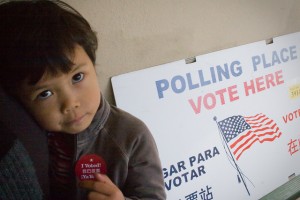Before 1870, it would have been unimaginable that a person of colour could have the right to vote in the USA, or that any woman, regardless of where she was, could participate in her country’s political life. Today, the notion that any individual be judged incapable or unworthy of expressing an opinion concerning his or her country’s political destiny solely on the basis of skin colour or gender seems absurd and discriminatory. The modern vision of democracy and the law gives each citizen a vote of the same value, independent of his or her ethnicity, gender, social status, or intellectual capacities.
Yet, in spite of our society’s willingness to acknowledge each individual’s right to participate free from discrimination, one segment of the population remains firmly removed from political decision-making: children.
What reason is commonly given to justify this difference in treatment? Children, because of their youth, are incapable of making up their minds about political matters. But to rely on age to decide whether or not a person can make use of her civil rights is just as hypocritical as basing one’s arguments on ethnicity or gender. Neither age nor skin colour nor gender indicates political maturity–and modern democracy does not demand maturity in any other sphere. Thus, nothing indicates that the vote of someone aged 45 or 80 would be of better quality than the vote of an 18 or 14-year-old. To the contrary, as all opinions are of equal value, it appears unjust to impose an artificial barrier based on age to limit the political rights of one segment of the population.
In 2013, the German Foundation for the Rights of Future Generations (Stiftung für die Rechte zukünftiger Generationen) advanced the notion of removing age barriers from the right to vote. In a petition called “We Want to Choose” (Wir wollen wählen) young people aged 9 to 17 expressed the reasons that motivate their wish to exercise this civil right. In essence, they criticised the fact that, whereas they are as affected by political decisions as the rest of the population, their opinion is not taken into account. Worse, the generation that decides on the future of the world is not the one that will have to live in it and deal with the consequences of past elections.
To be sure, before children could be allowed to vote, given their lack of experience in various domains, it would be necessary to give them the appropriate tools for thinking, via training in civics in school and objective, tailored information campaigns. In addition, care would need to be taken that they are not used by people they know wanting to increase the vote tally for their preferred candidate. But there is no reason to believe that such measures are not feasible.
Of course, when one considers the challenges that remain in the field of civil liberties throughout the world, the question of voting rights for children seems secondary. In too many countries, women still cannot freely exercise their political rights, ethnic or linguistic minorities are excluded, non-citizens are often long prevented from participating in the political life of their new country, and numerous dictatorships scorn a citizen’s right to express an opinion about their future.
It remains the case that the politics of today influence the politics of tomorrow, and therefore have an influence on the children of the world. Thus, the idea that they could participate in political life is perhaps not as unreasonable as it might first seem. At the very least, it merits further thought.
Written by Valentine Delarze Checked by Pierre Bourgeois Translated by Bronwen Claire Ewens Proofread by Chihiro Tsukamoto |
Sources:
Jörg Tremmel, Für ein alterunabhängiges Recht, sich in die Wählerliste einzutragen
http://www.generationengerechtigkeit.de/images/stories/Publikationen/positionspapiere/20130919_policypaper_wahlrecht.pdf
http://www.loc.gov/rr/program/bib/ourdocs/15thamendment.html



